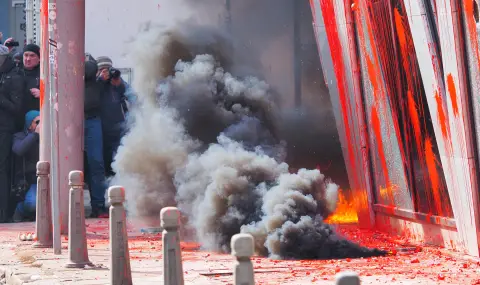„Die Zeit“ comes out with the headline: „Right-wing demonstrators attack the EU Representation in Sofia”. At least 2,000 people followed the call of the pro-Russian party „Vazrazhdane” to protest against the possible introduction of the euro in Bulgaria. They tried to break into the EC building in the center of Sofia. Demonstrators have been detained, as well as injured police officers. Far-right parties in the poorest country in the EU are demanding a referendum on the euro issue, which the parliament and the Constitutional Court have declared against, recalls „Die Zeit”.
Red paint, „Molotov” cocktails and scrambled eggs on the facade of the EU Representation building in Sofia: „Deutschlandfunk” uses the word "violence" for the protest by "Vazrazhdane" against the introduction of the euro in Bulgaria. The pro-Russian nationalist opposition party claims that Bulgaria would lose its national sovereignty, the media outlet writes, adding that the riots in the center of Sofia were strongly condemned by both the Bulgarian government and the President of the European Commission (EC) Ursula von der Leyen.
Violence and vandalism are not the solution
The coalition government, which was formed last month, aims for Bulgaria to join the eurozone from January 1, 2026, the newspaper "Frankfurter Neue Presse" writes in turn. It also focuses on von der Leyen's reaction. In Platform X, she wrote: "In Europe, we exercise our right to demonstrate peacefully. Violence and vandalism have never been the answer." The “Frankfurter Neue Presse“ reminds its readers that Bulgaria has been a member of the EU since 2007.
The German news agency DPA adds that before attacking the EC building, representatives of the pro-Russian nationalist party “Vazrazhdane“ shouted “No to the euro“ in front of the Bulgarian National Bank (BNB). “Vazrazhdane“ accuses the BNB of falsifying data to facilitate the introduction of the euro, DPA also writes.
Its leader Kostadin Kostadinov proposes a referendum on preserving Bulgaria's national currency, for which the party had collected 604,000 signatures. In 2023, however, the Bulgarian parliament rejected such an option, and according to a recent public opinion poll conducted by “Measure” At the end of January, more than half of adult citizens (57.1%) were against the euro "in principle", and 39% were against. Only 25.7 percent supported joining the eurozone in 2026.
